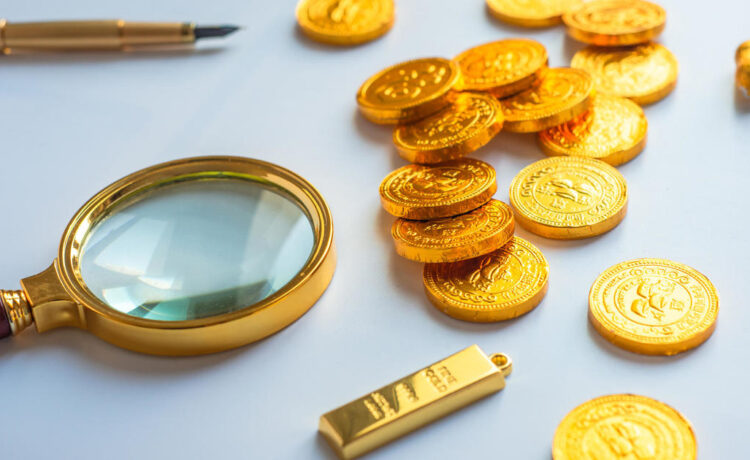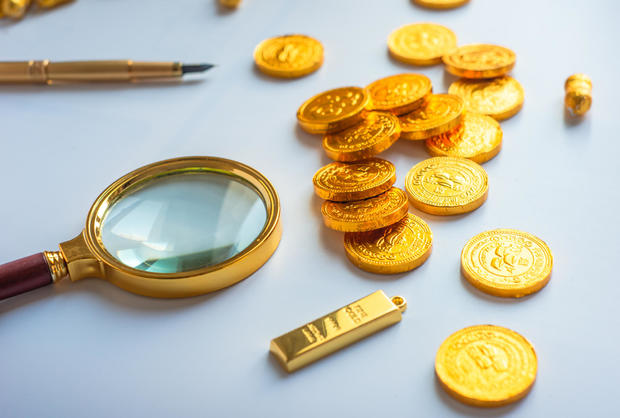JianGuifang/Getty Images
Economic conditions are uncertain right now. Inflation is cooling, the Federal Reserve is poised to cut interest rates and there are fears of a recession if unemployment continues to rise. It can all make investing a bit tricky right now.
Fortunately, gold investing doesn’t fall into that same camp. Long considered a safe-haven asset, gold is something investors move to in times like these.
“The gold market presents a great opportunity to hedge against the dollar,” says Nick Fulton, managing partner of USA Pawn Stores of Mississippi and chairman of the Mississippi Pawnbrokers Association. “Gold has risen over 27% in the last year.”
You can invest in gold in many ways, too. But which are the best in today’s uncertain economy? Below, we’ll break down some gold types experts recommend investing in today.
Explore your top gold investing options online here.
What gold investments are best in an uncertain economy?
Not sure what gold type is best to invest in right now? Here are a few that experts recommend right now:
Physical gold
The first and likely most obvious option is to buy physical gold bars and coins. These are a good option if you’re looking for a hedge against inflation or a smart way to store wealth.
“For those seeking a safe haven, storing physical gold at home provides peace of mind against financial instability or currency debasement,” says Ben Nadelstein, head of content at precious metals marketplace Monetary Metals. “Gold’s low correlation with equities and bonds makes it a powerful stabilizing force in a portfolio — even with just a small allocation.”
It’s also easy to find and buy (you can even purchase it at Costco) and, usually, just as easy to sell off, too.
“When investing in physical gold, bars offer very easy ownership,” says James Cordier, a commodities expert and founder of the Cordier Commodity Report. “One-, 10-, and 100-ounce sizes are generally all quite liquid when it comes to buying and selling.”
Get started with gold bars and coins here now.
Gold ETFs
Gold exchange-traded funds (ETFs) are another smart way to invest in gold right now. These are pooled investment funds that allow you to invest in a variety of gold-related assets all at once.
While they’re traded on exchanges just like stocks, they come with less volatility due to their more varied holdings. They also diversify your portfolio without you having to independently decide on individual investments.
To get started in ETFs, you’ll need a brokerage account, but this is often less hassle than purchasing bars or coins — especially if you’re limited on storage space.
“ETFs offer exposure to gold without the complexities of buying and storing physical gold,” says David Hollander, founder of Liberty Group, a wealth management firm in California. “Generally, the commissions and fees to acquire it are lower in a brokerage account vs. a hard asset retailer.”
Gold IRAs
Finally, there are gold IRAs, which allow you to invest in gold to save for retirement. These are types of retirement accounts that you can use to buy both gold as well as various other precious metals.
You have to open them through gold IRA companies — technically called custodians. You’ll then fund your account, and your custodian can then purchase gold and other products on your behalf. The holdings are then stored at an approved depository.
One benefit of these is you can use traditional or Roth IRAs for this purpose. This means you can fund your investment with pre- or post-tax dollars — whatever works best for your long-term plans.
Learn more about your gold IRA options online today.
Get professional guidance
There are many ways to invest in gold, and the right choice depends on your goals, budget, tolerance for risk, and more. To make sure you’re choosing the best option for your finances, talk to an investing professional. They can point you in the right direction.

















